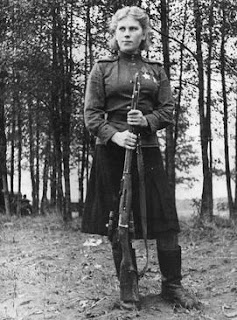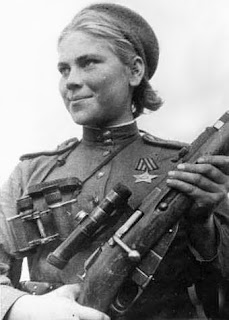Roza Shanina
Roza
Shanina fue francotiradora soviética durante la Segunda
Guerra Mundial y se convirtió en el terror de los soldados alemanes. Se
llamaba así en honor a Rosa Luxemburg.
Para saber: kolkhoz y en vocabulario:
logger
Su diario de combate se publicó por primera vez en
1965…
Shanina was killed in action during the East
offensive while shielding the severely wounded commander…
Roza
Georgiyevna Shanina (Ро́за Гео́ргиевна Ша́нина) fue una francotiradora soviética
durante la Segunda Guerra Mundial a la
que se le atribuyeron 59 muertes confirmadas, incluidos doce soldados durante
la Batalla de Vilnius. Shanina se ofreció como voluntaria para
el ejército después de la muerte de su hermano en 1941 y eligió ser tiradora en
la línea del frente. Elogiada por su precisión de disparo, Shanina fue capaz de golpear con precisión al enemigo y hacer
dobletes (dos disparos al blanco en dos disparos en rápida sucesión).
En 1944, un periódico canadiense describió a Shanina como "el terror invisible
de Prusia Oriental". Se convirtió en la primera mujer de servicio del 3er Frente Bielorruso en recibir la Orden de la Gloria. Shanina murió en acción durante la Ofensiva Prusiana Oriental mientras protegía al comandante de una
unidad de artillería gravemente herido. La valentía de Shanina ya recibió elogios durante su vida, pero entró en conflicto
con la política soviética de salvar a los francotiradores de las batallas
pesadas. Su diario de combate se publicó por primera vez en 1965.
 |
| Roza en 1944 |
Roza Shanina was born on 3 April 1924 in the Russian village of Yedma in
Arkhangelsk Oblast to Anna Alexeyevna Shanina, a kolkhoz milkmaid, and Georgiy Mikhailovich Shanin, a logger
who had been disabled by a wound received during World War I. Roza was reportedly named after the
Marxist revolutionary Rosa Luxemburg
and had six siblings: one sister Yuliya
and five brothers: Mikhail, Fyodor,
Sergei, Pavel and Marat. The Shanins also raised three orphans. Roza was above average height, with
light brown hair and blue eyes, and spoke in a Northern Russian dialect. After
finishing four classes of elementary school in Yedma, Shanina continued her education in the village of Bereznik. As there was no school
transport at the time, when she was in grades five through seven Roza had to walk 13 kilometres to Bereznik to attend middle school. On
Saturdays, Shanina again went to Bereznik to take care of her ill aunt Agnia Borisova.
Vocabulario
logger: a person who cuts down trees for wood. Faller,
feller, lumberjack, lumberman.
If you like
using a chain saw, then maybe you should pursue a career as a logger.
Para saber
A kolkhoz was a form of collective farm in
the Soviet Union. Kolkhozes existed along with state farms or sovkhoz. These were the two components
of the socialized farm sector that began to emerge in Soviet agriculture after the October
Revolution of 1917, as an antithesis both to the feudal structure of
impoverished serfdom and aristocratic landlords and to individual or family
farming.
The 1920s were
characterized by spontaneous emergence of collective farms, under influence of
traveling propaganda workers.
Roza Shanina
Roza Shanina was
a soviet sniper during World War II, credited with 59 confirmed kills including
12 soldiers during the battle of Vilnius. Shanina volunteered for the military
after the death of her brother in 1941 and chose to be a marksman on the front
line. Praised for her shooting accuracy Shanina was capable of precisely
hitting moving enemy personnel and making doublets. Allied newspapers described
Shanina “The unseen terror of East Russia.” She became the first Soviet female sniper
to be awarded the Order of Glory and was the first service woman of the 3rd
Belorussian Front to receive it. Shanina was killed in action during the East
offensive while shielding the severely wounded commander of an artillery unit.
Shanina´s bravery received praised already during her lifetime but came at odds
with the Soviet policy of sparing snipers from heavy fights. Her combat diary
was first published in 1965. Rosa Shanina was born on 3 April 1924 in a Russian
village…
También
Un video cortito sobre la vida de esta joven.
Artículos
relacionados
… ¿No creen que se han estado escondiendo durante
demasiado tiempo?"… Tiradora mortal
Early forms of
sniping or marksmanship were used during the American Revolutionary War… El francotirador
…la prosperidad puede surgir solo cuando el
agricultor y el empresario disfrutan de la libertad económica… ¡Tire
abajo este muro!
Cuidemos
la tierra que es nuestra casa y el único planeta que tenemos

No comments:
Post a Comment